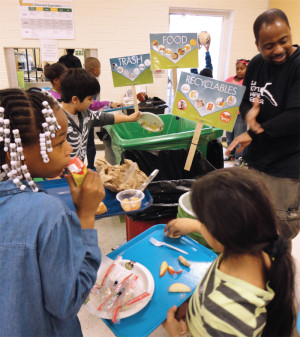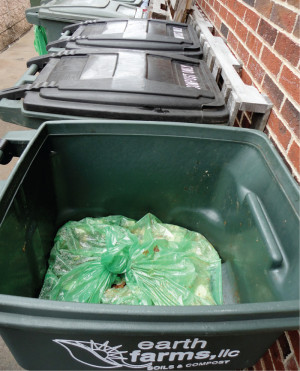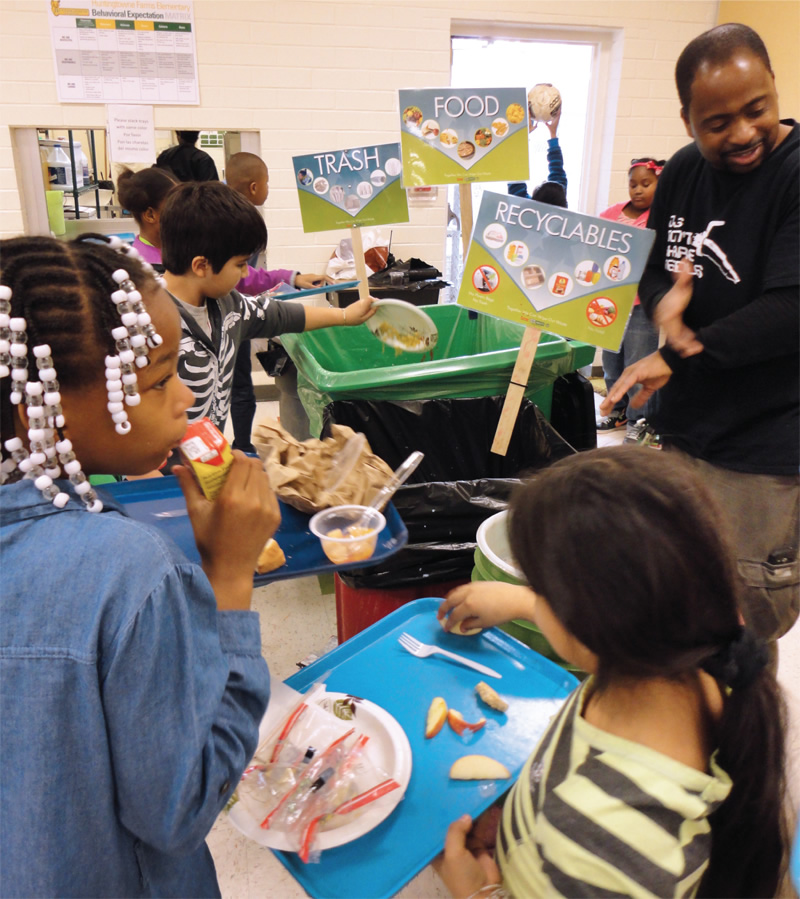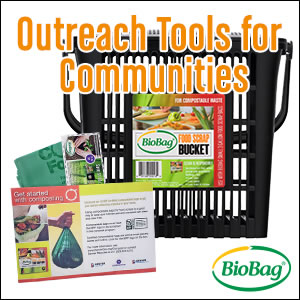About 25 schools are participating in a separation and composting pilot in the Charlotte-Mecklenburg Schools system, where 164 schools generate about 72 tons/week of food scraps.
Ryan Cooper
BioCycle May 2015

The county provides schools with 64-gallon green Toter collection containers, posters and other educational material. Foods scraps, soiled paper and napkins can be included.
Photo by Ryan Cooper
Looking for ways to increase diversion, food waste was identified as a significant portion of the Charlotte-Mecklenburg Schools (CMS) waste stream in Mecklenburg County, North Carolina. Capture of food waste for composting began in two CMS elementary schools in 2012, Allenbrook and Tuckaseegee, as part of a pilot partnership between Mecklenburg County Solid Waste (MCSW) and CMS. Five schools were enrolled in the program by the beginning of the 2014-2015 school year, and 18 more have since come on line. According to Derrick Harris, an Environmental Supervisor at MCSW, each student produces approximately one pound of food waste per week. Therefore, 144,000 students in 164 CMS schools produce roughly 72 tons/week of food waste, so there is enormous potential for waste diversion if collecting compostables at CMS schools should become system-wide.
Mecklenburg County Solid Waste (MCSW) is part of the Land Use and Environmental Services Agency and serves a population of at least 920,000 residents, including the City of Charlotte. Through an interlocal agreement in 1984, Mecklenburg County assumed responsibility for management of all waste generated and collected within the county, which includes seven municipalities that collect residential trash and recyclables within their jurisdictions. Some municipalities also provide limited collection of waste and recyclables from businesses. The MCSW contracts with Republic Services, Inc. to collect, haul and dispose of trash and recyclables from county buildings, CMS, Central Piedmont Community College (CPCC), and county jails. In 2010, the county invested $7.3 million to convert its Material Recovery Facility to process single-stream recyclables.
The 2012 Mecklenburg County Solid Waste Management Plan established a 49 percent waste diversion goal by Fiscal Year 2016-17. The MCSW released the Mecklenburg County Food Waste Diversion Study in 2012, which identified sources and generation rates of food waste in the county. A 2012 Waste Composition Study, commissioned by Mecklenburg County, calculated that 28 percent of the CMS waste stream is food waste. A team of CMS and MCSW staff has been working with principals, teachers, cafeteria staff, custodial staff, students and parents to divert CMS food waste into a compost product for use in schools and the community.
Pilot Program
Harris is responsible for enrolling schools in the food waste composting pilot project and making sure the program is running smoothly. Food waste, soiled paper and napkins collected at the schools go to Earth Farms Organics to be processed. Nadine Ford, Senior Environmental Specialist at MCSW, teaches students how to compost yard trimmings by setting up composting systems at local educational institutions. She emphasizes the relationship between compost, soil, and growing healthy food by incorporating composting and school gardens into schools’ curriculum.
Rusty Fuller, CMS’ Director of Custodial Services, provides essential guidance for the composting pilot. The process of enrolling a CMS school in the pilot begins with an invitation letter to the school. Essential to the success of this program is support from the principals, as well as cafeteria and custodial managers and staff. In addition, “environmental advocates,” who might be students, faculty, environmental groups on campus, or PTA members, are key to the program’s implementation. CMS also appoints a recycling coordinator for each school every year. A presentation introducing the program to stakeholders is made available to each participating school. Staff meetings are held to brief faculty and staff, and school news programs are used to inform students.

Toters are lined with compostable bags. Depending on the size of their student population, schools receive 1 or 2 bins for each day of the week.
Photo by Ryan Cooper
The county provides schools with 64-gallon green Toter collection containers, posters and other educational material. The Toters are lined with compostable bags supplied by BioBag. Students learn how to separate their food scraps from other trash and place them into a designated collection bin. At the end of each school lunch, the liner bag is tied and a new bin is rolled in for the next day. Depending on the size of their student population, schools receive one or two bins for each day of the week, plus one or two extra (6-12 bins in total), and compostables are collected once a week.
On the Friday before a school is scheduled to start the program, the bins are dropped off and staged. Each school determines where the bins should be placed to collect food scraps and stored when full, depending on the building layout. The following week, MCSW staff stand at the new bins, helping students, faculty and staff navigate the system. County staff remains in direct communication with CMS staff about problems and reports these issues to principals, who can make necessary changes. Compost program start-ups are accompanied by follow-up visits. Harris’ experience is that after 2.5 weeks into the program, students “really flow through the process.” The schools also are able to recycle milk cartons, using 35-gallon collection containers supplied by the Carton Council, an industry association.
The food waste from participating CMS schools is collected by Earth Farms Organics, based in Dallas, North Carolina, and owned and operated by Jim Lanier (see accompanying article). The county pays the fees charged for collection of the source separated organics during the pilot, so there is no added expense for CMS. The composting facility has not experienced any problems with contamination in the CMS food scraps. Lanier donates or sells the compost back to the schools at a reduced rate for school gardens and landscaping. The fact that the compost contains the students’ food scraps is communicated to them, and students often help spread it in school gardens and landscapes.
Pilot Findings
The two original schools have “done great,” notes Harris, adding that after a period of time and working out operational issues, “they didn’t really need our help.” Teachers, cafeteria workers, custodial staff, and composting advocates within the schools continually monitor students and manage daily operations of the pilot project.
Complaints from schools about odor or cleanliness are minimal because liners help prevent odor problems. The biodegradable bags also reduce the need to clean collection containers and eliminate the separation of plastic bags from organics during collection or processing. Earth Farms Organics provides liner bags for each container every time food scraps are collected.
One CMS school, adjacent to forestland, expressed concern about wildlife being able to enter the bins after they were filled and placed outside. County staff put 1-inch IRWIN spring clips on the lids to prevent raccoons and other animals from getting into the cafeteria scraps. There have not been any problems so far.
JW Grier Elementary, with over 900 students, is one of the models of the pilot program. “The students are so engaged,” says Harris, noting that when asked about what they were doing and why, “they took ownership and appreciate themselves for doing something that helps the environment.” After more than two school years, the students have the routine down, and says James Matys, Head Custodian, the youngsters have “come a long way.”
Metro School was among the first five schools to participate in the program. Lunchtime trash was reduced by roughly 50 percent when food scraps were diverted. Students at Metro can make salads from produce grown in the school’s compost-amended garden. At Elizabeth Lane Elementary, which enrolled in the program in October 2014, about 900 students are diverting about half a 64-gallon bin of food waste per day.
Harris cites another success story at Chantilly Montessori, where food scraps composting was eagerly embraced. The school started preparing students in December for the rollout in January. Not only did the school post a large sign featuring common items to be recycled, but also created a video about food waste composting to educate and train students.
Harris is excited about the potential to start a food scraps collection program at Independence High School, a large institution with more than 2,000 students. This would mark the first high school participating in the food waste collection pilot.
Measuring Diversion
Mecklenburg County finances the CMS food waste composting program through an Enterprise Fund (the fund is financed through recycling proceeds). In addition, a $33,275 Community Waste Reduction and Recycling Grant from the North Carolina Department of Environment and Natural Resources (DENR), was awarded in 2014. Matched with $6,655 from the county, the grant funded the purchase of 180 new 64-gallon Toter brand bins for new schools that enroll, which eliminates the rental fee charged by Earth Farms. The grant funds waste reduction infrastructure, promotional and educational material, and incentives for schools that participate.
The biggest challenge facing the pilot program is documenting waste reduction, diversion from the landfill, and financial savings. Measuring the amount of food waste generated and the amount of trash disposed at each school is a challenge. This information is critical as knowing how often a school needs trash collected can save CMS money on “picks,” i.e., each time a truck arrives at a school to pick up a dumpster full of trash. The food waste composting program results in an average reduction of one to two picks, or a savings of roughly $10 to $20 per week per school for CMS. Tracking these numbers will greatly improve the chances of the program’s expansion to all of the schools in the CMS system. An assessment of waste disposal by CMS schools is one of CMS’ and Mecklenburg County’s primary objectives.
Convincing schools to participate is another challenge. Harris looks to the principals of schools that have had success with the program as “ambassadors” to schools that are considering enrolling. Calculating diversion rates and the resulting financial savings at participating schools could also help convince those that are hesitant to join the pilot. Incentivizing participants is also very important to the success of the program. Mecklenburg County has already provided cafeteria and custodial staff with “Be Cool, Compost in School” t-shirts, but a goal is to give schools, faculty, staff, and students shirts, stickers, pizza parties, or other prizes for their participation.
Ryan Cooper is a Project Associate at GreenBlue in Charlottesville, Virginia.













